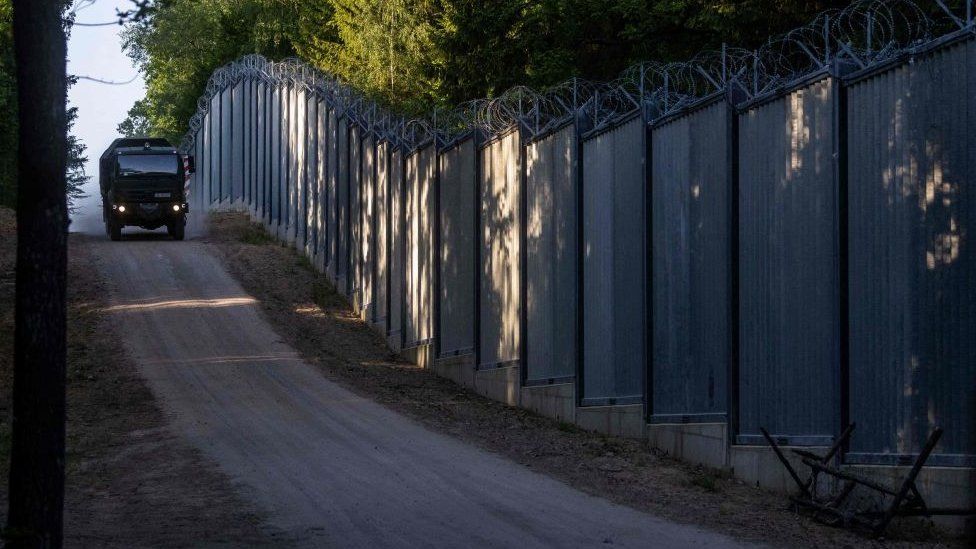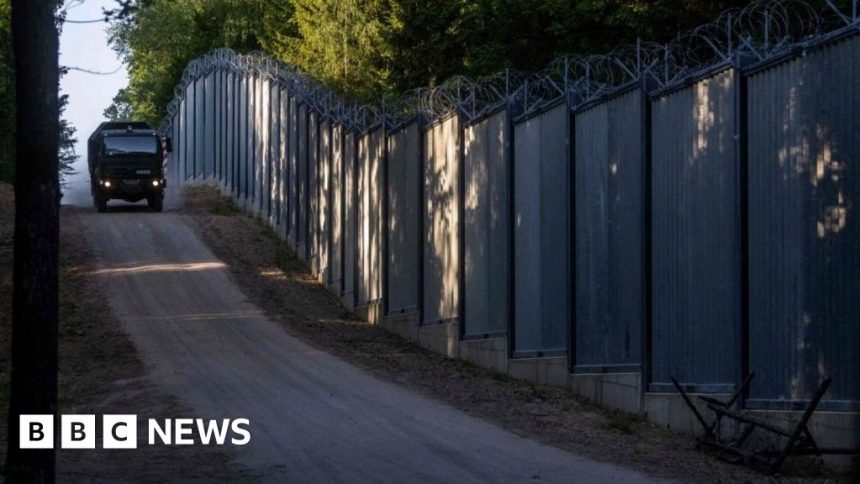Poland minister denies ‘pushback’ of pregnant Eritrean woman at border
-
Published

Poland has denied that a pregnant Eritrean woman gave birth alone at the Poland-Belarus border after activists said soldiers had “pushed her back”.
Deputy Interior Minister Maciej Duszczyk told the BBC the woman came to the Polish border with her newborn and was taken to hospital.
But activists said she had previously tried to enter Poland and had been in the forested border area for a month.
The new Polish government has vowed a “more humanitarian” border policy.
But activists say that Polish border guards are continuing to push back migrants who are attempting to cross the border from Belarus. Poland accuses Belarus of encouraging the flow of migrants as an act of “hybrid warfare”.
Mr Duszczyk said it would be virtually impossible for a woman to live in the forest for a month in very cold temperatures and give birth alone.
He said border guards took her to hospital in Hajnówka, close to the border, when they found her.
However Adam Barwiński from Grupa Granica – an organisation of activists and human rights workers who help people trying to cross the border – told the BBC that the 38-year old woman told the organisation that she had approached Polish soldiers after crossing the border fence but had been denied entry into Poland.
Mr Barwiński said the woman, who didn’t want to be named, had also told them that she’d been on the road for many years “searching for a safe place”, and before coming to the Polish border from Belarus, she had spent several years in refugee camps in Ethiopia, Kenya and Uganda. She had given birth alone in the forest, Grupa Granica said.
“This drama must end, no one should be forced to give birth under such circumstances,” said Mr Barwiński.
On Saturday activists said she had left hospital and was in an apartment with her baby.
Mr Duszczyk denied that the government of Donald Tusk was continuing pushbacks and said its top priority was “zero deaths at the border”.
“When the Eritrean mother and baby were taken in by soldiers at the border and sent to hospital, she asked for international protection, and we’ve started the procedure under EU law,” he said
“We do our best to help teenagers and women, and since January this year, we’ve accepted 350 migrants asking for international protection,” he added.
In January more than 100 NGOs and 500 activists and cultural figures urged Mr Tusk to end pushbacks and said his government was condoning human rights violations if it did not do so.
However activist Iwo Los, also from Grupa Granica, said the practice was continuing.
His organisation said border guards had pushed back more than 1,700 people since December. Some 25 of these people were still missing and five were known to have died, it alleged.
Mr Duszczyk said the Polish government was facing an “organised, instrumentalised migration war” being carried out by Belarus.
Poland alleges that since 2021 Belarus has been encouraging people from the Middle East and Africa to travel to Belarus and then cross the border illegally to Poland.
In 2021 the European Union accused Belarus’s authoritarian leader President Alexander Lukashenko of facilitating the influx in retaliation against sanctions.
“We’re trying to combine security with humanitarianism while saving our border in line with EU law,” Mr Duszczyk said.
-
-
Published10 August 2023
-






